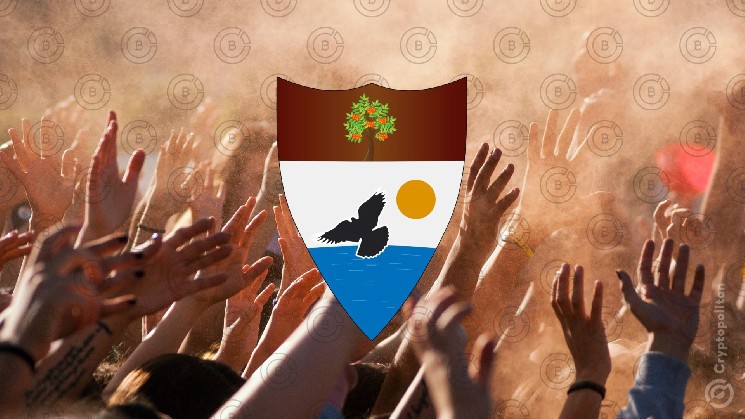Is Liberland the key to crypto’s true revolution?

Liberland. A micronation claiming an uninhabited stretch of land between Croatia and Serbia. Founded in 2015 by Vít Jedlička, this little nation has big ambitions.
Its core belief is libertarianism. Minimal government, maximum personal freedom. What makes it stand out? It’s a state built for the age of blockchain and cryptocurrency. No taxes, no borders, no interference.
Last week, the election of Justin Sun, the founder of Tron, as Prime Minister put the spotlight directly onto this micronation, turning it into a potential hub for a true crypto revolution.
Blockchain governance and decentralized power
Under Sun’s leadership, the goal is simple:- turn Liberland into a completely decentralized nation, where blockchain governs everything.
From voting systems to contracts, even citizenship processes, blockchain has replaced old-school bureaucracy. The idea is to create a system where everything’s transparent, secure, and decentralized.
They launched the Liberland Dollar (LLD) on Solana just a few days ago. Why Solana? It’s obvious. Solana can process up to 65,000 transactions per second, with almost no fees.
That’s a game-changer for microtransactions and makes Solana an ideal platform for Liberland’s ambitions. The average transaction fee is just $0.00025.
Since transaction costs can kill blockchain adoption, this is huge. And for Liberland, it means running a nation without the sluggishness and costs that traditional systems bring.
Crypto incentives and citizenship
Liberland is a tax haven for anyone trading or investing in crypto. They’re offering citizenship to those who invest in the economy or take part in development projects.
They’re pushing hard to get people involved, not just as citizens, but as active participants in building this crypto-first economy.
You can apply for citizenship by contributing to Liberland’s economy, and if you help build up their ecosystem, you’re rewarded with “Liberland Merits,” which is their version of a digital asset.
If you spend enough time in the nation, you even qualify for free citizenship. Liberland has been heavily engaging with the global crypto community.
Earlier this year, they were at Bitcoin 2024 in Nashville to show off their blockchain-based governance model.
The goal is to build a strong community around the nation’s decentralized systems. More people, more talent, more innovation.
Land, legal challenges, and diplomatic recognition
Liberland isn’t recognized by any other country. In fact, its territorial claims are disputed by both Croatia and Serbia.
The land in question, about 7 square kilometers, lies in a disputed area on the Danube River, in a patch of land that neither country wants to claim.
Liberland has no infrastructure and lies on a floodplain, which makes it tricky for anyone looking to settle there.
Access to the land is often blocked, and anyone who tries to step foot in the area is usually detained or arrested. Founder Vít Jedlička himself has been arrested many times for attempting to enter the territory.
Despite these challenges, Liberland’s legal team continues to push the idea that the land they claim is unclaimed by either Serbia or Croatia.
They invoke the “terra nullius” principle, arguing that since neither country officially recognizes the territory, they’re free to claim it.
Croatian authorities, on the other hand, aren’t amused. They’ve demolished makeshift structures built by Liberland supporters, threatened them, and generally just made it clear that they’re not willing to let this micronation take root.
But still, as of March, Liberland had 1,200 registered citizens who paid up to $10,000 for passports. Over 735,000 people have applied for citizenship, with many wanting to contribute to the construction of this new society.
They’ve built close ties with Somaliland, another unrecognized republic, and are seeking recognition from libertarian-leaning governments.
Financially, Liberland has been involved in several commercial activities. They’ve issued coins, postage stamps, and rely heavily on voluntary donations and taxes from their crypto ventures.
In 2023, it reported an annual income of $1.5 million, mostly from Bitcoin. More than 99% of the nation’s reserves are held in Bitcoin, which some analysts believe is incredibly risky.




 Bitcoin
Bitcoin  Ethereum
Ethereum  Tether
Tether  Dogecoin
Dogecoin  USDC
USDC  Cardano
Cardano  TRON
TRON  Chainlink
Chainlink  Stellar
Stellar  Hedera
Hedera  Bitcoin Cash
Bitcoin Cash  LEO Token
LEO Token  Litecoin
Litecoin  Cronos
Cronos  Ethereum Classic
Ethereum Classic  Monero
Monero  Dai
Dai  Algorand
Algorand  OKB
OKB  Cosmos Hub
Cosmos Hub  Stacks
Stacks  Theta Network
Theta Network  Gate
Gate  Maker
Maker  KuCoin
KuCoin  Tezos
Tezos  IOTA
IOTA  NEO
NEO  Polygon
Polygon  Zcash
Zcash  Synthetix Network
Synthetix Network  Tether Gold
Tether Gold  TrueUSD
TrueUSD  Dash
Dash  Holo
Holo  Zilliqa
Zilliqa  0x Protocol
0x Protocol  Enjin Coin
Enjin Coin  Qtum
Qtum  Basic Attention
Basic Attention  Siacoin
Siacoin  Bitcoin Gold
Bitcoin Gold  Ravencoin
Ravencoin  Decred
Decred  NEM
NEM  DigiByte
DigiByte  Ontology
Ontology  Nano
Nano  Status
Status  Hive
Hive  Huobi
Huobi  Lisk
Lisk  Waves
Waves  Numeraire
Numeraire  Steem
Steem  Pax Dollar
Pax Dollar  BUSD
BUSD  OMG Network
OMG Network  Ren
Ren  Bitcoin Diamond
Bitcoin Diamond  Bytom
Bytom